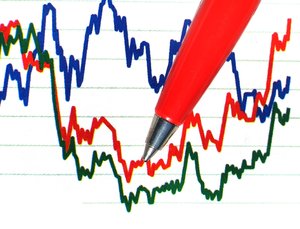Share Investing - Prices
 Which shares should I buy and how much should I pay?
Which shares should I buy and how much should I pay?
A company's share price is equal to whatever the company is worth divided by how many shares are on issue. But how do you decide what a company is worth? Well you can look at it from the other angle, a companies worth is equal to the share price times the number of shares on issue.
A widely accepted theory called The efficient market hypothesis (EMH) states that all shares are perfectly priced according to their inherent investment properties, the knowledge of which all market participants possess equally. Or on the share market both the buyers and the sellers know everything there is to know about the company and there are enough shares and participants that buyers and sellers will always agree on a price and so whatever the price a share trades at is its true price, in theory.
So the EMH says that we can determine the value of a company by starting with the share price. Of course the market isn't perfect, for example the number of cases we read and hear about where one party obviously knows a lot more than everyone else and profits from it proves the market isn't perfect.
But the markets are usually "perfect enough", generally the market is a pretty good indicator of current value, particularly for the larger companies. At any given moment a price might not be exactly what it should be but you can be reasonably sure it wont be too far away. You can also be reassured that there are an awful lot of people watching the markets. Analysts and investors are constantly on the look out for breaking news and snippets of information about a company that might affect its share price. And contrary to what you might hear, there are lots of rules protecting the share market investor trying to make it as fair and transparent as possible however they certainly aren't perfect.
So in general the current market price of a share is a pretty good indicator of the value of a company. Now we can look at just the share price as the number to concentrate on which is a lot easier than trying to remember all those millions of dollars of profit or shares on issue.
But remember, price and value are different things and as investors we should be concerned with the return we will get from the company we are investing in over our investment time frame. We want to pay a price that we believe will give us a reasonable return. Not enough return means the price may be expensive, more than enough return means the price may be cheap or the risk may be very high.
In that last paragraph I deliberately used the word company rather than share, because that is what we are investing in - a company.
When we look at what we are buying as a company rather than "shares" we can start to ask ourselves some questions such as: is it a good company? Is it making things that people might want to buy in the future? Will it make a profit? How much profit is it going to make this year, next year, and the year after that and then for another 10 years. Then what will it look like? Will it be huge or still small?
If you think that you can already look at a company and answer those questions to your own satisfaction, then you could be a successful investor in the share market. If not and your prepared to do some study and accept advice, it's not too late for you. But if you are not prepared to learn or take advice then it's probably time to start considering managed funds and or a managed portfolio.
When you are looking for shares to buy, where do you start? Even on our tiny little sharemarket there are over 160 companies listed. Some say start with the biggest companies, others say look for those with the lowest PEs others say look for those paying the highest dividend, who's right?
In truth probably a combination of those along with a host of other factors, and a bit of luck. Luck because we are trying to forecast the future and we simply can't anticipate everything. We can't yet determine when an earthquake will hit, or the founder will die in a plane crash, or any of the many other factors which can destroy a companies worth in an instant.
So where do you start, which shares should you buy and how much should you pay?
There are two widely accepted approaches to analysing company share prices:
- Fundamental Analysis where you use financial ratios to assist you to determine whether to invest in a share, and
- Technical Analysis where you use charts and graphs to determinie whether to invest or not.
If you have any general questions about shares or the share market please email them to
Next we'll cover the basics of Share Investing - Fundamental Analysis.
- Last updated on .